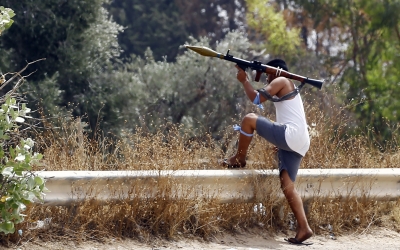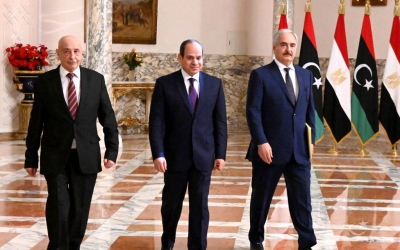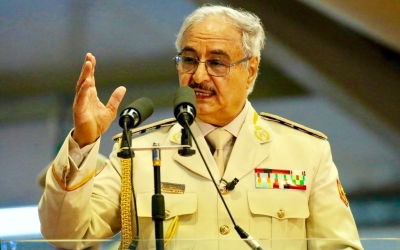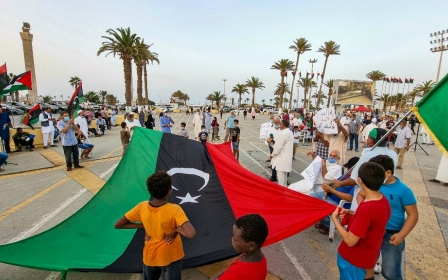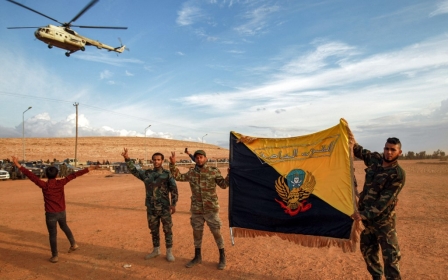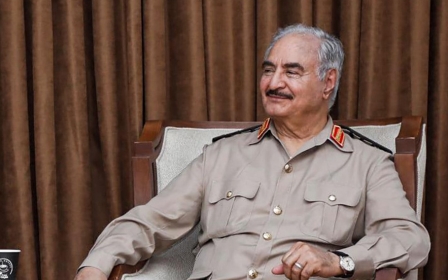Libya's Khalifa Haftar faces obstacles to winning US support
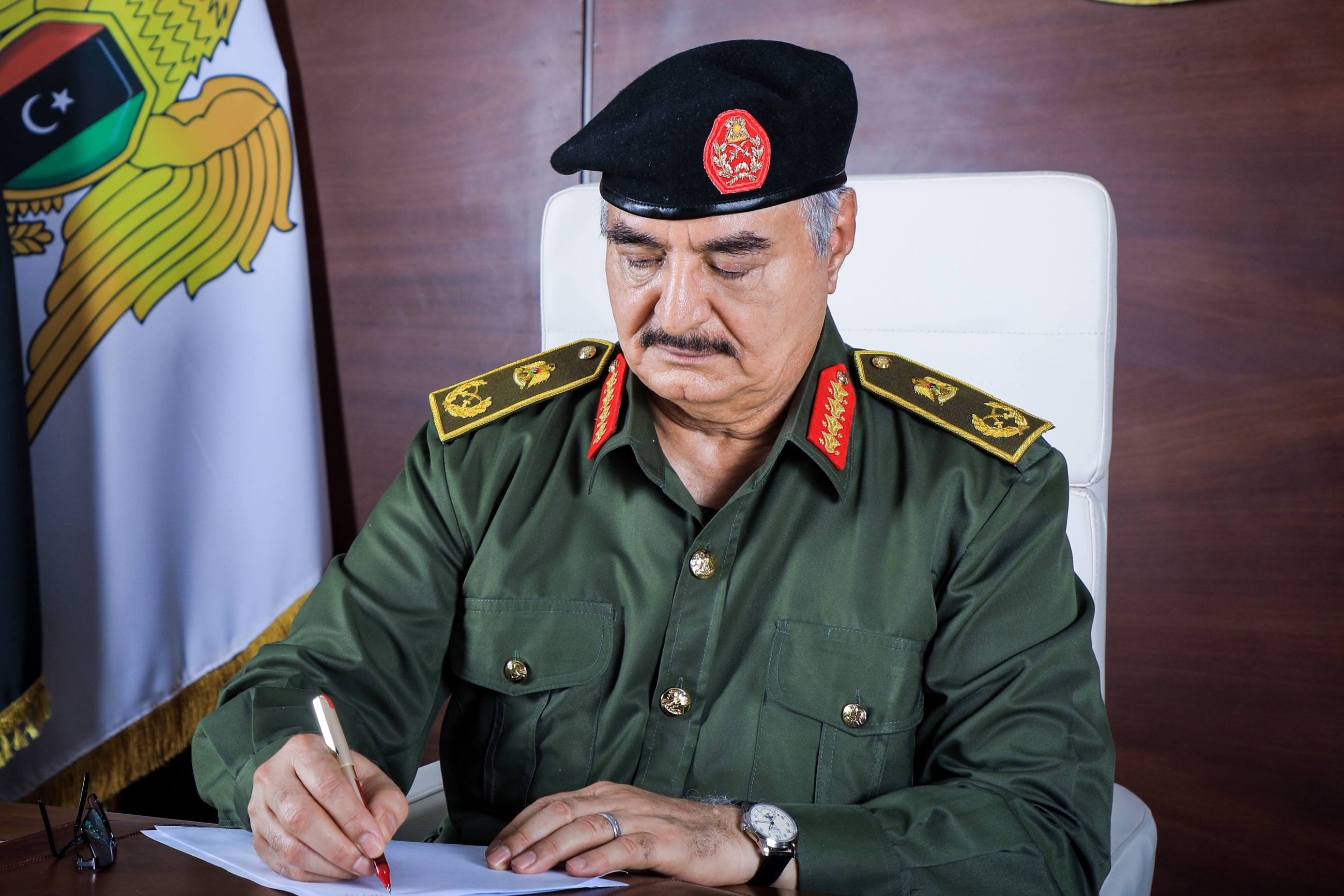
Libya's eastern commander Khalifa Haftar is facing a number of setbacks in Washington, with recent lobbying efforts stalling and potentially damaging legislation working its way through the US Congress.
Haftar hired a former top aide to US President Bill Clinton and a retired Republican lawmaker in September, in preparation for what many believed would be his bid for the presidency in elections slated for later this year.
But according to documents filed with the US Department of Justice and seen by Middle East Eye, the six-month contract that Haftar signed with Lanny Davis and former congressman Robert Livingston, a deal thought to be worth roughly $1 million, was suspended on 30 September.
Lobbying firm Rawlings International Advisory Group, which introduced Haftar to the Washington heavyweights, has also terminated its agreement with the Libyan commander, MEE has learned.
Haftar's lobbying efforts also coincided with a raft of legislation being debated in Congress that could pose serious challenges for the renegade commander and his future aspirations in Libya.
Last month, the House passed the Libya Stabilization Act (LSA), which seeks to impose sanctions on those who violate Libya's arms embargo or who seek to undermine stability and security in the country. A similar bipartisan version of the bill has been introduced to the US Senate by Senators Chris Coons, Lindsey Graham, Chris Murphy and Marco Rubio.
According to a statement released by the senators, the bill would sanction those who commit human rights violations or support foreign military intervention in the country. It also looks to specifically address the presence of Russian mercenaries.
A congressional source with knowledge of the legislation told MEE that support for the bill across party lines may demonstrate an emerging consensus among US lawmakers who are concerned the presence of foreign fighters could derail the country's first scheduled elections to be held since an October 2020 UN-brokered ceasefire.
"All eyes are focused on December and trying to make sure that elections take place as scheduled," the source said on condition of anonymity.
"This bill aims to create a conducive environment for those elections, which is the top priority on Capitol Hill."
A good investment?
Some Libyans, as well as several regional powers, have seen Haftar - who was a former military commander under longtime ruler Muammar Gaddafi - as a potentially stabilising force in the country.
Others, however, have accused him and his forces of authoritarian tendencies and of committing war crimes, as well as trying to overthrow the internationally recognised government.
Hafed al-Ghwell, a fellow at the Foreign Policy Institute of the Johns Hopkins University School of Advanced International Studies, told MEE the Libya Stabilization Act's passage in the House may have been interpreted as a sign that "Haftar was a bad client to have in this town".
"I don't think any of the big gun lobbyists really see him as a good investment at this stage," he added.
A former CIA asset, Haftar returned to Libya following the country's 2011 uprising and served in the internationally recognised government until 2014 - when the country's many fractures became more deeply entrenched with the outbreak of the second civil war since the fall of Gaddafi.
In 2019, Haftar mounted a 14-month assault on the capital, Tripoli, to oust the internationally recognised government. Fighting soon devolved into a proxy conflict with his Libyan National Army (LNA) receiving support from Russia, the United Arab Emirates, Egypt, Chadian and Sudanese fighters, as well as mercenaries reportedly from the Wagner Group.
Haftar was eventually pushed back after Turkey intervened, with Ankara deploying Syrian fighters, combat drones, and military equipment to support the government in Tripoli.
Ghwell said the commander's inability to take the Libyan city has generally been seen as a turning point for his international support.
"He still has some backing from the Emiratis, the Saudis and Egyptians, but his military campaign failed," Ghwell said. "He is also 77 years old, and I don't think he is seen as a viable option by anyone."
'Too weird'
Haftar, a US citizen who lived in northern Virginia for nearly two decades, is the subject of several lawsuits in US courts from plaintiffs who allege his forces have carried out grievous rights violations, including extrajudicial killings, torture and other war crimes.
The 77-year-old is also no stranger to DC's lobbying halls. At the height of his assault on Tripoli he engaged high-profile firms - reportedly including Linden Strategies - to rally support within the Trump administration.
An April 2019 phone call between Haftar and Trump stoked rumours that Washington was throwing its weight behind the commander, who some saw as a bulwark against Islamists and the Islamic State (IS) group.
But a source with direct knowledge of the matter told MEE on the condition of anonymity that relations between the White House and Haftar soured soon after the call.
According to the source, trouble began in May 2019 after Haftar's forces captured an American citizen operating as a pilot for the internationally recognised government.
Jamie Sponaugle, a US Air Force veteran, was eventually released - but was held for six weeks and prevented from speaking with the State Department while in captivity.
"Holding the pilot was what cost him [Haftar] the relationship with the Trump administration and ruined whatever goodwill he had in Washington at the time," the source said. "He was snubbed after that. He just made it too weird."
The passage of the Libyan Stabilization Act in the House and the abrupt end to Haftar's agreement with Davis and Livingston has fuelled speculation as to what Haftar expected to gain from the high-power duo who said their work was "limited to expressing Field Marshal Khalifa Haftar's support of free and fair, UN-supervised elections on December 24".
In a statement, Davis and Livingston told MEE: "We offer the Field Marshal our best wishes that he can carry out the commitment he made to us, leading us to represent him under FARA and as stated in our mission statement in our contract: That he will continue to support the UN-supervised free and fair elections as scheduled on 24 December 2021."
Anna Massoglia, an investigative researcher on foreign influence at OpenSecrets, said it was unclear which side terminated the lobbying contract, or if it was mutual, but the timing could prove a clue.
"To have legislation that is not necessarily favourable to their client, that could have been enough reason that [Haftar] was not pleased with the outcome there," she told MEE.
'We don't intend to let them fly'
While the Libya Stabilization Act (LSA) has attracted the attention of Haftar's opponents, it still faces an uphill climb to becoming law, according to Emadeddin Muntasser, a Libyan-American activist working to promote the legislation on Capitol Hill.
While the LSA passed the House easily, Muntasser said he expects it to meet some resistance in the Senate.
"The next stage will be more difficult. There will be more deliberation," he said, adding that even if the bill became law it would likely take a year to be implemented.
Perhaps more troubling for Haftar are two amendments buried in a mammoth US defence spending bill which were introduced by Democratic Congressman Tom Malinowski.
The Senate is set to decide whether to include them in their final version of the bill in the coming weeks, offering a potential quick victory for Haftar's opponents.
One amendment requires the president review those violating the UN arms embargo on Libya and look to impose sanctions on them, while the second is seen as a direct challenge to Haftar in that it requests the Department of State to report on war crimes and torture committed against US citizens in Libya.
A congressional source told MEE the language makes it clear who would be affected by the amendment.
"It essentially asks the DOJ to look into allegations of war crimes against a US citizen," the source said, without specifically naming Haftar.
"There are clear and serious allegations about a person and we don't intend to let them fly by."
Middle East Eye delivers independent and unrivalled coverage and analysis of the Middle East, North Africa and beyond. To learn more about republishing this content and the associated fees, please fill out this form. More about MEE can be found here.


